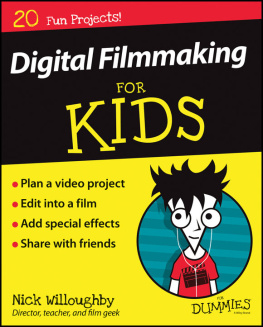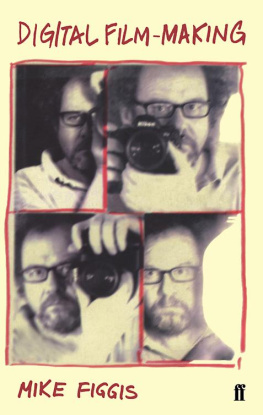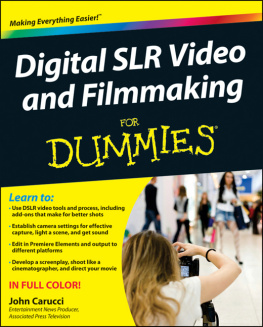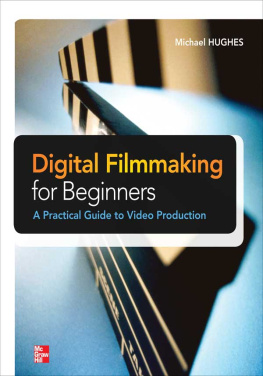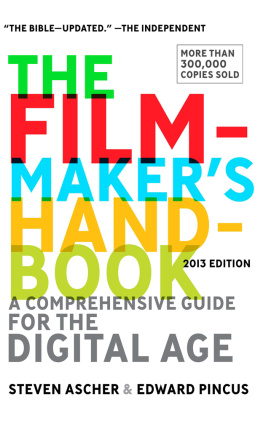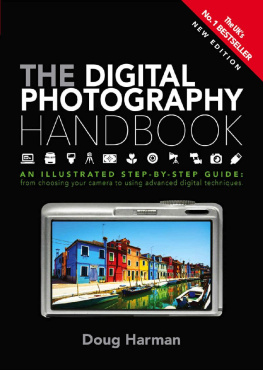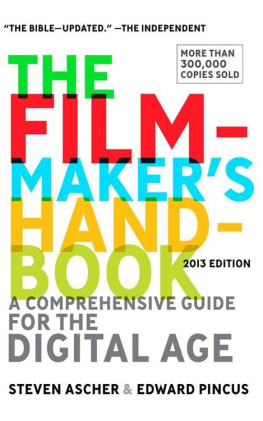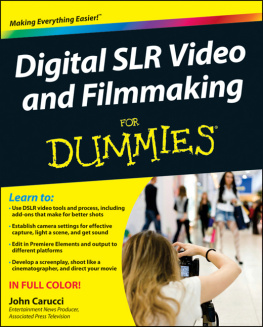
CONTENTS
Foreword
Movies are a kind of magic. It follows that filmmakers are kind of magicians too. We create grand illusions that entertain, that make us laugh, and make us cry. And if you are reading this book, I suspect you are already an illusionist in the making.
Since the invention of movies, expensive cameras and filmstock have blocked so many filmmakers from producing their stories for the big screen. Thats all changed now. The only limitation you face is how big is your imagination? And what was previously the big screen, is now any screen, from the one down at your local multiplex, to the small screen on your phone.
We no longer need massive, big budgets and famous actors, nor posters the size of houses. Through social media we can connect with other filmmakers and actors, we can share knowledge and resources, as well as connect directly with audiences.
We are genuinely living through a cultural and industrial revolution the likes of which the film business has never experienced.
And believe it or not, you are about to ride the crest of this exciting wave.
Over the years, I have made feature films, TV shows and even been Oscars-shortlisted for a short film. Through the Guerilla Film Makers Handbooks I wrote, I have interviewed literally hundreds of filmmakers and if there is one thing that truly unites all of us, them, you and me, it is the love of movies and the making of them.
The act of thinking up an idea, writing it, seeing it brought to life with actors, light, design, music, editingand finally presenting our flickering, magical illusion to an audience is an amazing experience.
And if you are lucky and talented enough to create something that really connects with people with thrills, laughter, tears, scares, reflection, even world-changing ideasthen you are in for an amazing ride, and hopefully a prosperous career too.
There are many hurdles ahead of you, but if you are resourceful Im sure you will find your way over, around, under, or through them. Know that at each one you encounter, youll probably feel like there is no way forward. Some will give up at this point. But you wont. Keep going. Never stop. Never give up.
If you dream big and never take no for an answer, then who knows, and I might be seeing you at the Oscars one day soon.
Let the magic begin.

Chris Jones,
London
Introduction
Filmmaking has changed beyond recognition in the last few years, with ever cheaper and more accessible technology and the emergence of large-sensor DSLRs. There has never been a better time to shoot your own expert HD footage and, in a few simple steps, shape it into a coherent story. It is now possible to shoot a beautiful-looking film completely on DSLR, with minimal or no crew, and achieve something that can happily be screened in cinemas or on TV. In this book we will show you how easy it is to progress from a little smartphone video to a well-shot short or even a feature film.
This book will teach you in easy steps how you can graduate from a fully automatic point-and-shoot to more advanced formats and kit, until you are confident enough to shoot, record and edit your own footage and sound and create professional videos and films. If you have ever wanted to pick up a camera and shout action, then this book is for you. Whether you want to make your name with the next independent breakthrough movie or just improve your own family videos, you will find lots of useful practical information on all aspects of filmmaking here.
The book follows a natural progression from basic to advanced level, to allow you to build up your knowledge and skills in all aspects of filmmakingfrom video and sound recording to editing and finishing. We mix in the theory you need with practical tips and techniques to help you gain confidence in using your camera and sound-recording gear, before diving into drama production and advanced post-production. Each section can also be read individually if you want to jump straight in.
THE BASICS
In this preliminary section we will be teaching you how to make and finish your first film. We will cover all the basic techniques for video and sound recording and suggest ideas for filming specific types of films, before completing the section with a look at editing and exporting your film to the internet.
Your equipment
Here, well look at the equipment youll be using for filmmakingwhat the gear is for and why you might need it. Theres a mix of basic and advanced equipmentfrom video cameras and microphones to lighting, computers, video monitors and steadicamsto help you decide what is right for you now and what might be useful in the future.
Using your kit
Once we know what we need, well start to look at how to use it. In this section we cover camera-handling techniques and how to set up lighting and sound-recording gear, and go through the technical areas of shot composition, shutter speed, ND filters, using depth of field, setting color balance, using picture styles and choosing between natural and artificial lighting for the best effects.
If you are the proud owner of a new video camera, try getting to grips with it in a peaceful, natural environment, so that you can take your time exploring all the settings without being hassled.
Your first film project
Now its time to put your new knowledge into action by filming specific projects such as a friends wedding, live music, a sports or wildlife film, interviews or family videos. Learn about basic makeup and what not to wear, as well as how and when to use different camera shots to make your editing easier.
Basic editing
This section explains how to physically get your video from your camera into your computer and how to edit it into your first video using entry-level software. We show you how to add a soundtrack and video effects and then upload your video to the internet to share with friends and family.
ADVANCED FILMMAKING
Armed with the skills to create a simple project, well now delve a lot deeper into the art of filmmaking, especially into techniques used for shorts and feature drama as well as documentary production. We will cover all aspects of the digital filmmaking process, from planning, scriptwriting and casting to shooting the film and eventually taking it into the edit. Well explain how to add special effects, sound effects and Foley until you have a finished film on Blu-ray or the internet.
Pre-production
Before we go into the actual shoot, we take you through the process of pre-production, where you will learn how a script is written, what makes an exciting story, and what genre your story might fall into. Then we will consider all the tasks that need to be organized before you start shooting your film, like planning and scheduling the production, finding funding sources, how to go about casting your film, how to choose locations and get filming licenses for them, and tips on makeup and wardrobe.


